Is the cupboard under your sink full of bottles and bottles of household cleaning products? You are not alone! There seems to be a specific product for every household cleaning job. But did you know that you can do away with most of these harsh chemical cleaners and clean just as effectively with something as simple as apple cider vinegar? It sounds unbelievable but it is true! And it's more environmentally friendly too. Let's take a look at how.
Apple cider vinegar is fermented juice made from apples. To make vinegar, a sugar source is fermented until it becomes alcohol (hence "cider vinegar") then it is fermented again to make acid.
In apple cider vinegar's case, this acid is acetic acid. You may have heard people make some pretty strong health claims about apple cider vinegar. It is a probiotic so could help to control your blood sugar and it does have antioxidant and antimicrobial properties. But we're not here to talk about the health benefits of apple cider vinegar. We want to know how it can help us clean our home.
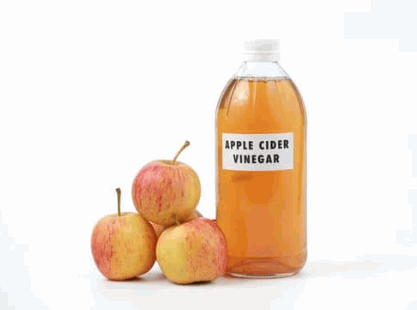
The acetic acid in apple cider vinegar is an effective cleaning agent that can deal easily with lots of common household cleaning issues. It also has antibacterial properties so can help to ensure that when you clean surfaces, they are also kept safe.
Apple cider vinegar is perfect as an all-purpose cleaning solution. It will work on most surfaces without causing any damage, including painted walls. A diluted solution is ideal for general everyday cleaning.
You should aim for a 2:1 ratio of water to apple cider vinegar. Adding a few drops of essential oils such as tea tree oil or lavender will also help your house to smell gorgeous.
Its antibacterial properties mean that it is suitable for cleaning kitchen surfaces and other areas that need to be bacteria-free. If you have any areas that might need a closer antibacterial clean, such as cutting boards, you can apply a stronger or undiluted solution (although it can stain the wood so try not to leave it on for too long).
Check out: Remove Efflorescence From Brick With Vinegar
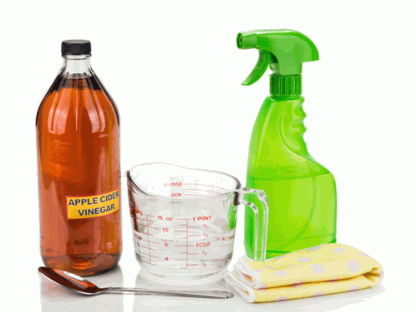
Apple cider vinegar also works great as a deodoriser because the acid neutralises odours. Spray on a 1:1 ratio of water to apple cider vinegar to the fabric and give it a rub with a dry cloth or dry paper towel and your odours should be gone in no time. Again, adding some essential oils will mean that the odours aren't just gone, they are also replaced with a fresh scent.
You can use apple cider vinegar to clean your dishes. Add some to your dishwasher cycle to get your plates, cups, bowls, and glasses sparkling, or add it to your sink if washing dishes by hand.
It can even remove stains, including tough stains from your coffee cups. In this case, it may be better to add some straight vinegar to your cup and then give it a good cleaning. For lighter stains, you can use a diluted apple cider vinegar solution.
Check out: Ultimate Pub Cleaning Checklist
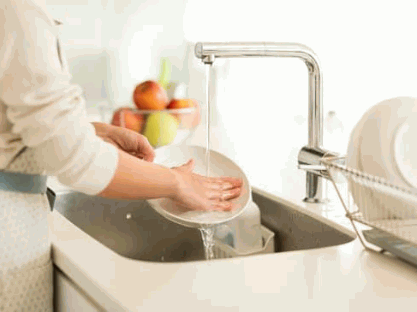
Adding vinegar to your wash cycle may seem a bit strange but apple cider vinegar is a great addition to your washing powder that can help your clothes stay fresh.
Apple cider vinegar is especially good at removing mildew from items like your shower curtain or bathroom rug.
And it is also a good idea to add it to your wash cycle when you are washing towels. If you have ever noticed that your bath towels seem stiff and not absorbent, this is often because of a build-up of soap that has created a layer on the surface of the towel.
Many commercial washing powders and liquids contain a fabric softener which is only going to make the situation worse.
Washing your towels with apple cider vinegar instead will strip the soap off the surface and leave your towels soft and absorbent again.
We all know we should be cleaning our washing machine and dishwasher and apple cider vinegar is a cheap and easy way to do this. Bacteria grows really easily inside these machines, as does limescale, both of which apple cider vinegar can help with.
Add straight apple cider vinegar to your washing machine or dishwasher and run a cycle with the machine empty, and it will be clean in no time.
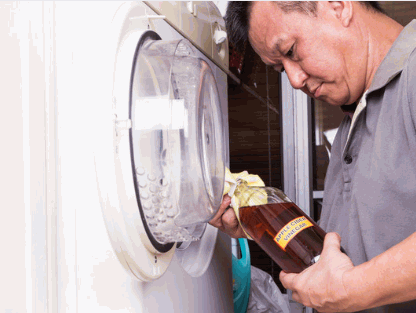
Apple cider vinegar is effective at removing pesky mildew from your bathroom. If it is a small amount of mildew, you can use a diluted solution in a spray bottle. Aim for a 1:1 ratio of apple cider vinegar and water and you should be able to scrub the mildew straight off.
If the mildew is more severe, you should use full-strength vinegar. Pour it onto the mildew and let it sit for half an hour before scrubbing it off.
Apple cider vinegar cleaning is also great for getting rid of soap scum because the vinegar counteracts the soap. And it is surprisingly effective at removing hard water stains. These are those brown streaks you often see at the bottom of the toilet bowl or in the sink.
Applying apple cider vinegar can be a bit tricky for the toilet bowl but as long as you manage to cover the stain, it should be fine. Leave it for an hour then come back and get to work with a scrubbing brush and those stains should be history.
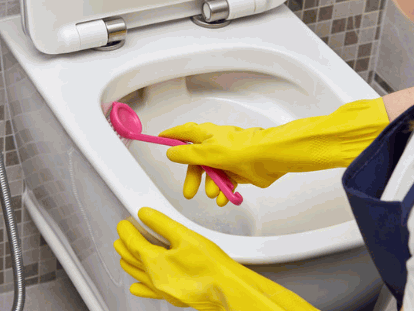
If you get frustrated by seeing streaks on your windows, apple cider vinegar can help with that. Make up a solution in a spray bottle of two-thirds water and one-third apple cider vinegar cleaning and spray it on the window. Wipe it off with a paper towel and then give the window a buff with a microfiber cloth and it will be shiny and streak free in no time.
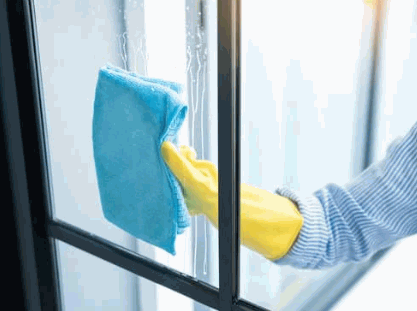
A clogged drain can be an absolute nightmare. Commercial drain cleaner can help but it is also harsh and sometimes quite expensive. A clever apple cider vinegar and baking soda cleaning hack is to take advantage of the chemical reaction that takes place between acids and alkalis.
Specifically, pour baking soda (an alkali) down the drain followed by apple cider vinegar (acid) and you will see that telltale bubbling that you see in volcano school projects.
Pour hot water or boiling water down afterward and the blockage should get shifted. You may need to repeat the process a few times if there is a stubborn clog.
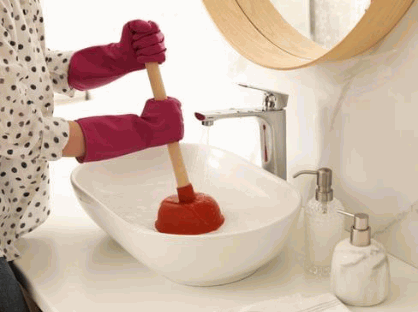
If you can be a bit clumsy with your wine glasses or cups and you have left behind water stains on your wooden furniture, this doesn't have to be permanent damage. Apple cider vinegar can often remove water stains. Apply undiluted apple cider vinegar to the affected area, leave for 30 minutes, and then wipe off with a clean cloth.
Fruit flies can be a real pain in any kitchen. And once they're there, it can seem almost impossible to get rid of them. Believe it or not, apple cider vinegar can also help you to get your kitchen fruit fly-free.
Fill half a cup or a third of a cup with apple cider vinegar and add some drops of soap. The apple cider vinegar will attract the fruit flies and the soap will trap them. It's not a pretty solution but it works!
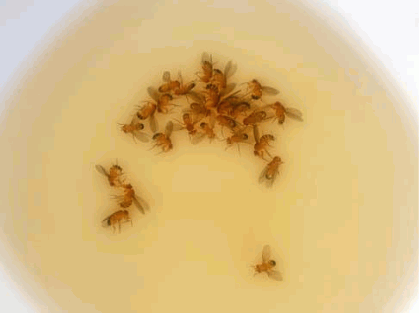
Apple cider vinegar and white vinegar are quite similar. They are both effective as cleaners because of their natural acidity. White vinegar is made from fermented alcohol grains rather than apples which is why it is white-coloured rather than amber.
White vinegar is a stronger acid but it also has a stronger smell, which is why many people opt for apple cider vinegar for their routine maintenance around the house.
Check out: How To Clean Soot Off Bricks
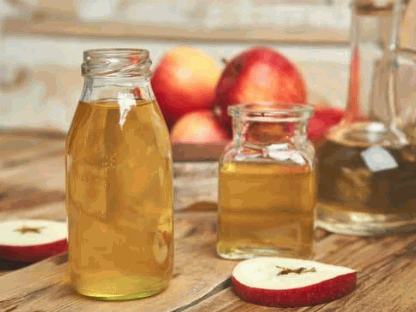
Apple cider vinegar is a cleaner's best-kept secret. It's an environmentally friendly, sustainable, and low-cost cleaner that is just as effective as many of the commercial cleaners that you see on the shelves. Try apple cider vinegar these cleaning hacks at home and you will be amazed at all the different ways that you can use it!